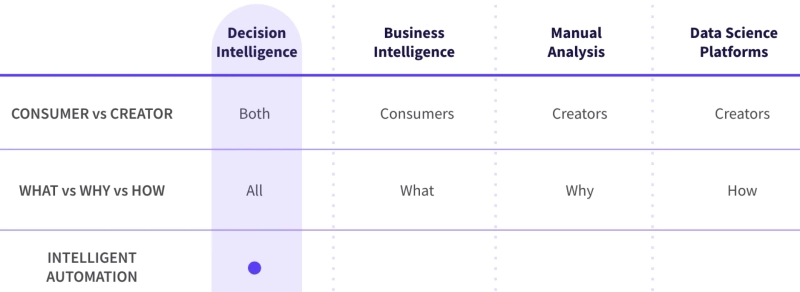In an era where data is often referred to as the new oil, businesses are awash with information, and making informed decisions has become a complex, yet critical challenge. This is where Decision Intelligence comes to the forefront, offering a path to harness the potential of data to make smarter, more strategic decisions. In this blog post, we will explore Decision Intelligence, its significance, and how it can empower organizations in our data-driven world.
What is Decision Intelligence?
Decision Intelligence, often abbreviated as DI, is an interdisciplinary field that combines data science, AI, and decision-making processes. It focuses on using data-driven insights to enhance decision-making across various domains, including business, healthcare, finance, and more. Decision Intelligence aims to bridge the gap between data analytics and practical decision-making by providing actionable insights.
The Significance of Decision Intelligence
Informed Decision-Making: DI allows organizations to make decisions backed by data, reducing the reliance on gut feelings and instincts. This, in turn, leads to more informed and rational choices.
Predictive Analytics: DI employs predictive modeling to anticipate future trends and outcomes, giving organizations a competitive edge by enabling proactive decision-making.
Risk Mitigation: By analyzing data comprehensively, Decision Intelligence can identify and mitigate potential risks, reducing the chances of costly mistakes.
Resource Optimization: DI helps optimize resource allocation, ensuring that organizations allocate their time, money, and talent effectively.
Implementing Decision Intelligence
Data Collection: Start by collecting relevant data from various sources. The quality and quantity of data play a crucial role in the effectiveness of Decision Intelligence.
Data Analysis: Use advanced analytics and machine learning algorithms to extract valuable insights from the data.
Integration: Integrate the data-driven insights into the decision-making process, making them accessible to relevant stakeholders.
Continuous Improvement: Decision Intelligence is an ongoing process. Regularly analyze new data and adjust strategies as needed.
The Future of Decision Intelligence
The future of Decision Intelligence looks promising. As data sources continue to expand, and AI and machine learning algorithms advance, the potential for smarter decision-making becomes limitless. Organizations that embrace Decision Intelligence will be better equipped to navigate the complexities of the modern business landscape.
Decision Intelligence is the key to unlocking the true potential of data in our data-driven world. It empowers organizations to make more informed, strategic decisions, helping them stay competitive and relevant in an ever-evolving market. As technology continues to advance, embracing Decision Intelligence will be a crucial step for those seeking to thrive in the age of data.


